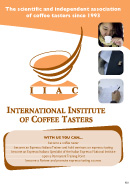Illycaffè and Coca-Cola launch canned “Cappuccino”
The Coca-Cola Company and illycaffè SpA announced the companies have finalized their global joint venture and will be introducing three premium ready-to-drink (RTD) coffee products in several European countries in April. Consumers in 10 European countries will be able to purchase three premium ready-to-drink coffee products.
The products are:
• Caffè: bold, full-bodied character, real Italian ‘chilled caffe.’ First ready-to-drink coffee to offer black (no milk) espresso-based coffee.
• Cappuccino: intense uplifting aromas of illy espresso, blended with milk and dark cacao.
• Latte Macchiato: smooth fresh illy espresso experience, swirled with milk.
The products will be available in cans (150 ml for Caffè and 200 ml for the milk variants). All three offerings will be available in 10 European Coca-Cola Hellenic markets including Austria, Croatia, Greece and the Ukraine. The initial launch is a result of a joint venture between Ilko Coffee International and Coca-Cola Hellenic.
Additional countries in Europe, Asia, North America, Eurasia and the Pacific are slated for expansion throughout the remainder of 2008 and into 2009 and will be delivered through The Coca-Cola Company system.
The highly profitable RTD coffee category globally is valued at just under $16 billion and has experienced several years of growth that is expected to continue. Globally (excluding Japan), the ready-to-drink coffee category has grown at an average rate of 10.1% over the past five years.
“When we announced the partnership between The Coca-Cola Company and illy a few months ago, we committed to deliver the perfect ready to drink espresso experience”, said Muhtar Kent, president and chief operating officer, The Coca-Cola Company. “Today, we believe we have delivered on that promise with an authentic Italian coffee experience. I look forward to this partnership delivering these great brands across the globe and enhancing our global leadership in the fast growing RTD coffee category”.
“Over the past few months, we put the effort in to bringing to life the illy taste in three new ready to drink espresso-based products”, said Andrea Illy, illycaffè chairman. “Now, our objective is to give consistency – together with Coca-Cola – to what premium ready to drink coffee is. Coca-Cola in its history has invented entire new product categories. illycaffè is the company that greatly contributed to the definition of the espresso category. Together we will redefine how people engage with a ready to drink coffee in order to experience a true small luxury pleasure”.
(Carlo Odello)

